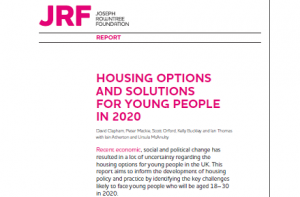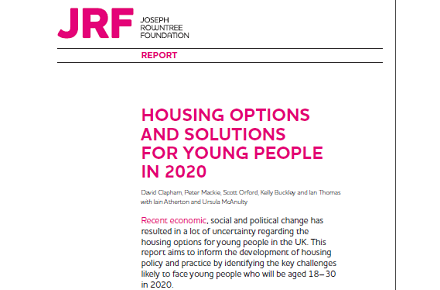A report published today by the Joseph Rowntree Foundation warns of an escalating housing crisis which is set to lock over one million young people out of home ownership by 2020.
 |
| [relatedPosts title=”Related Posts”] |
|
|
The report, Housing options and solutions for young people in 2020, finds that an extra 1.5 million 18 to 30-year-olds will be forced into private renting in just eight years’ time.
It means many young people’s dreams of owning a home will never come true, while many more will have a much longer wait before they own their own properties.
An extra half a million young people will be forced to stay with their parents well into their 30s, taking the total number of young people living with mum and dad to 3.7 million by 2020.
In 2020, the number of home owners under 30 will nearly halve, with just 1.3 million expected to own their own homes. The number of homeless young people under 25 is predicted to rise to 81,000, with further increases expected.
The influx of young people chasing accommodation in the private rented sector (PRS) means that young families, poorer and vulnerable people will find it hardest to compete for tenancies with around 310,000 more young families looking for private rented housing in 2020.
The report warns of a ‘three-tier’ system developing in a race to find PRS housing, with those at the top who can afford to pay, a ‘squeezed middle’ group who might struggle to pay and a bottom rung of 400,000 who risk being excluded completely.
The authors make a number of recommendations to remedy these problems, including:
- The provision of more affordable rents and longer, more stable private rented tenancies, with tax breaks for landlords who offer such options.
- The expansion of local letting agencies who find suitable private rented housing and protect vulnerable young people by acting as brokers between young people and landlords.
- Addressing the long term undersupply of housing to improve affordability.
Kathleen Kelly, Programme Manager for Place at the JRF, said: “Our badly functioning housing system will see those on the lowest incomes really struggling to compete in the competitive rental market of 2020.
“Renting is likely to be the only game in town and young people are facing fierce competition to secure a home in what is an already diminished supply of housing.
“With 400,000 vulnerable young people, including families, on the bottom rung of a three-tier private renting system we need to avoid turning a housing crisis into a homelessness disaster.”
David Clapham, lead author of the report, added: “With 1.5 million more young people no longer able to become home-owners by 2020, it’s vital we take the opportunity to make renting work better. To do this we need strong political leadership that is willing to work with both landlords and tenants to make it more affordable and stable for ‘generation rent’.
“Young people are at a double disadvantage – it takes longer to raise enough for a deposit and their wages are generally lower. But there are simply not enough homes and those we do have cost too much to rent or buy. While more housing would help address this, it may not come quick enough for young people forced into renting in eight years’ time.”
Housing options and solutions for young people in 2020 PDF is available here.
.





